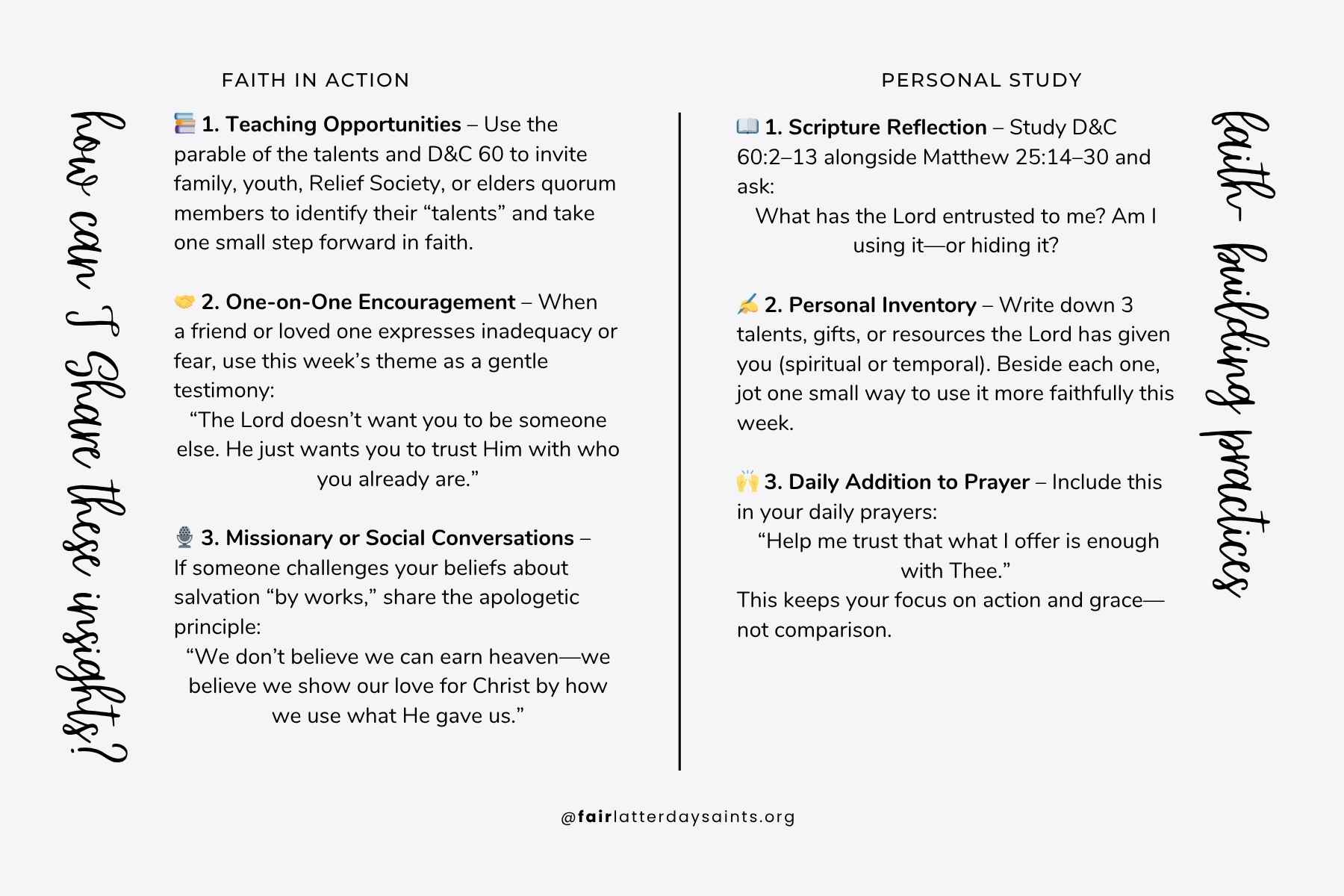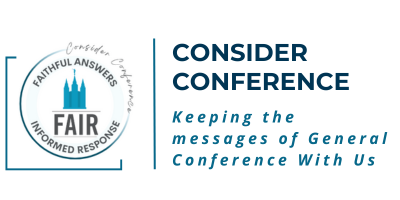
Overcoming Fear, Comparison, and Inaction in the Light of Christ
What does it really mean to be ready to meet the Savior—at His Second Coming or at the end of our mortal journey?
In his message Personal Preparation to Meet the Savior, Elder Dale G. Renlund teaches that Christ’s return should not fill us with fear, but with hope. Using three parables from Matthew 25, Elder Renlund outlines a pattern of preparation not based on dramatic change or public deeds, but on quiet, faithful consistency.
At the heart of this preparation is a personal reckoning: Are we living as the Savior invited us to live—or are we holding back out of fear, comparison, or self-doubt? Elder Renlund urges us to:
- Overcome fear by trusting Christ more than uncertainty.
- Stop comparing by recognizing that the Lord measures our faithfulness, not our resumes.
- Act in faith with what we uniquely have, knowing that our offerings, however small, are precious to Him.
These teachings are not abstract ideals—they are the daily, deliberate choices of discipleship. Whether we meet the Savior at His coming or at our life’s end, Elder Renlund reminds us that we prepare by living our covenants, serving others, and embracing the person God created us to become.
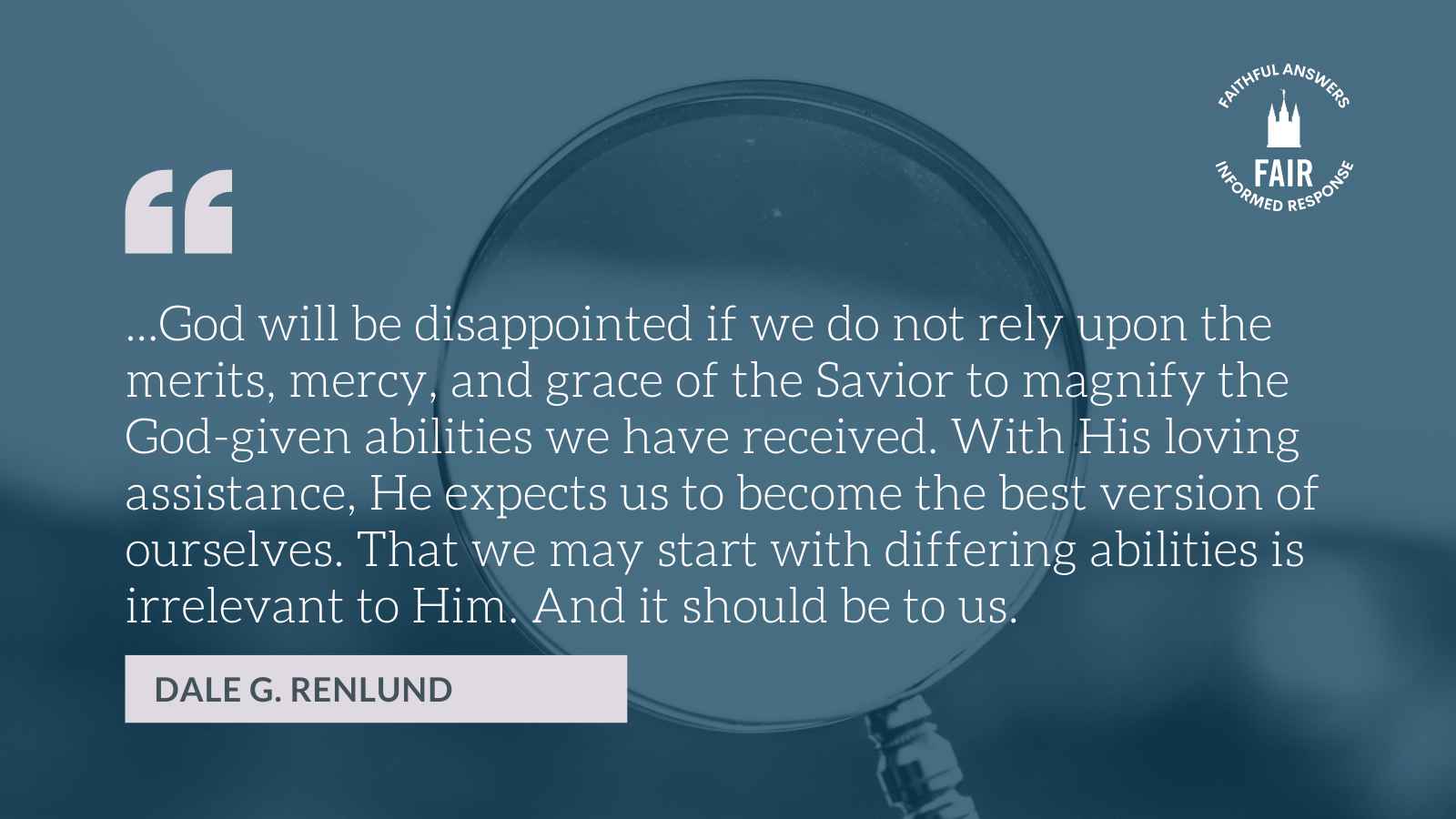
Apologetic Issues: Readiness and Individual Worth in Christ
Criticism: The Church teaches that Latter-day Saints must earn their way into heaven by being good enough, which causes unnecessary fear and perfectionism.
Response: Elder Renlund directly addresses this fear-based misconception: “God will be disappointed if we do not rely upon the merits, mercy, and grace of the Savior.” Latter-day Saint doctrine affirms that we are saved by Jesus Christ, not by our own perfection. Personal preparation does not mean performing flawlessly—it means trusting the Savior, repenting daily, and moving forward with hope. The parables Renlund teaches from (especially the wise virgins and talents) demonstrate that the Lord does not expect us to have identical gifts or results—only faith-filled effort rooted in covenant trust. The Savior’s grace magnifies our sincere efforts, no matter how small, and prepares us to meet Him.
Common Fallacy: Straw Man – Misrepresenting someone’s position to make it easier to attack.
This criticism misrepresents Latter-day Saint beliefs by creating a straw man, suggesting that we believe in salvation by self-sufficiency.
Correction: True doctrine emphasizes covenant partnership with Christ. As we do our part—however imperfectly—He fulfills the rest with mercy, power, and love.
Social Issue: Comparison Culture and Spiritual Anxiety
Question: If I’m not as spiritual, talented, or successful as others, does that mean I’m not ready to meet God? The effects of Comparison Culture and Spiritual Anxiety.
Response: Elder Renlund offers a powerful reassurance: “That we may start with differing abilities is irrelevant to Him. And it should be to us.” The Lord judges our hearts, not our highlight reels. The parable of the talents teaches that the reward was the same for both servants who magnified their gifts—regardless of how much they were originally given. Fear, comparison, and hesitation come from the adversary. Christ invites us to prepare by becoming our best selves, not someone else’s version of righteousness.
Common Fallacy: False Equivalence – Treating two unequal things as if they are the same.
This concern commits a False Equivalence Fallacy, assuming that differing spiritual gifts or outward accomplishments equal differing value in God’s eyes.
Correction: Readiness is not measured by outward status, but by inward commitment and humble effort.
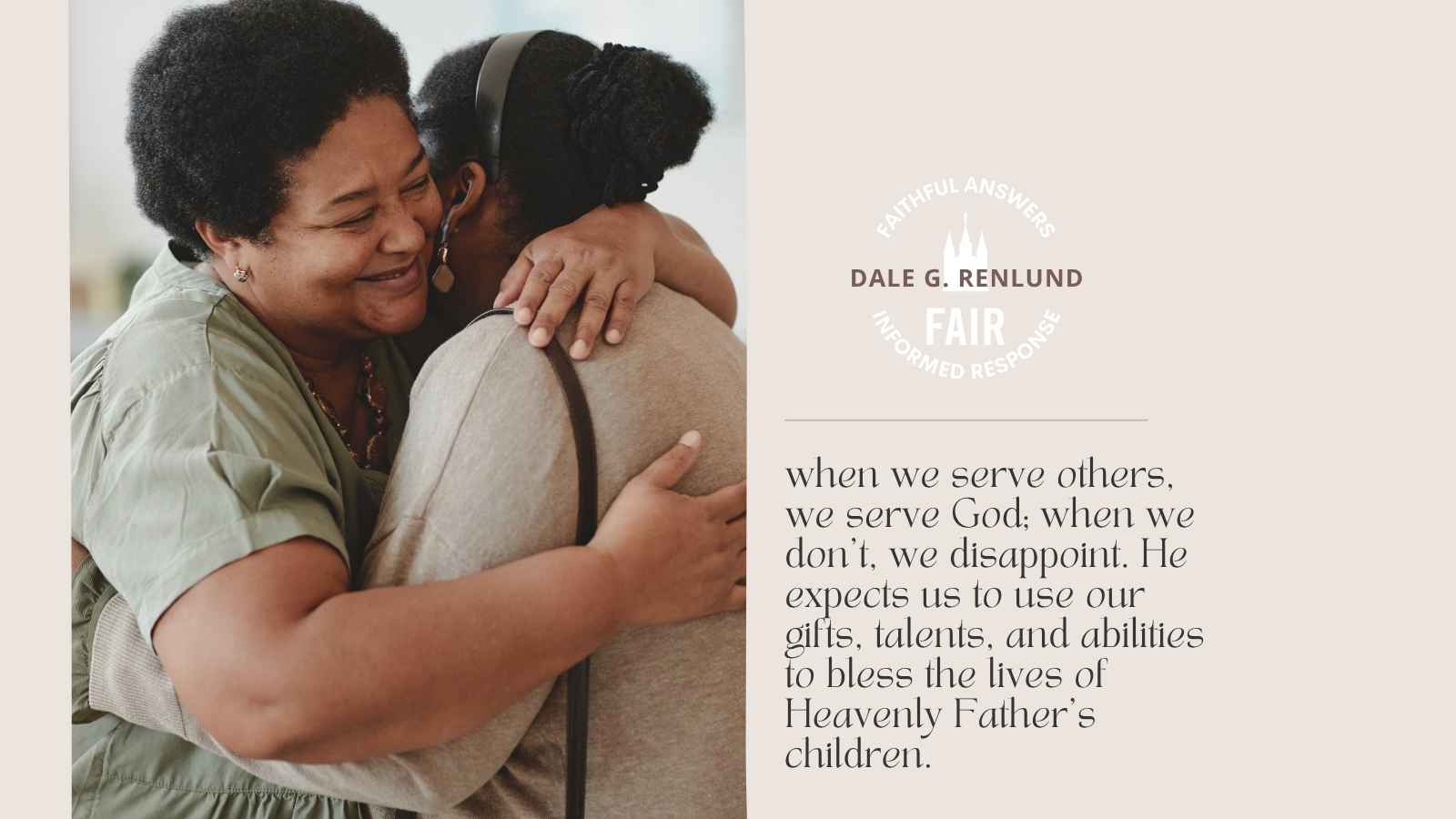
Apologetic Application: Divine Stewardship and Individual Accountability
Core Doctrine: God entrusts each soul with divine gifts, and He holds us accountable not for equality of outcome, but for faithful effort. This stewardship model is rooted in love, agency, and grace—not perfectionism or performance pressure.
The doctrine of divine stewardship teaches that God entrusts each of us with unique abilities, opportunities, and spiritual responsibilities—and that He judges us not by comparison with others, but by our individual faithfulness. As taught in Doctrine and Covenants 11:7, “every man may receive his own reward, according to his own labor,” and Mosiah 4:27 reminds us that the Lord does not require more than we have the strength to give. Elder Renlund builds on this eternal principle through the parable of the talents, affirming that what matters most is not how much we begin with, but how faithfully we magnify our God-given stewardship. Our efforts must be rooted not in fear or perfectionism, but in trusting “the merits, mercy, and grace of the Savior” to lift and magnify what we offer.
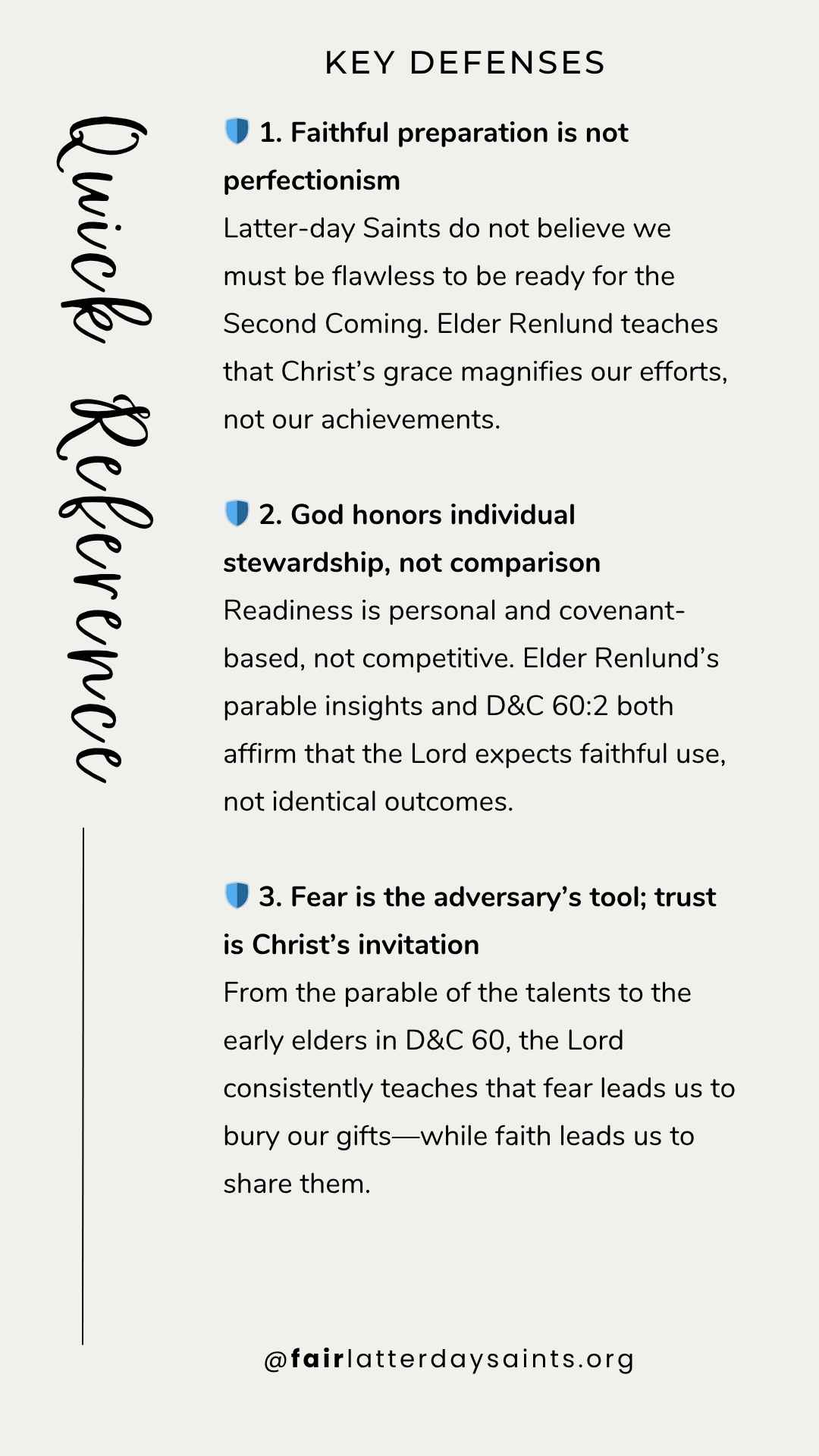 Defending Core Beliefs
Defending Core Beliefs
1⃣ Salvation is through Christ, not performance. Some critics claim that Latter-day Saints believe salvation must be earned through personal righteousness or works-based perfection. But the restored gospel clearly teaches that we are saved by grace through the merits, mercy, and grace of Jesus Christ. Our actions—like keeping covenants, serving others, and repenting—are not attempts to earn heaven but demonstrations of our faith in the Savior and willingness to follow Him. As Elder Renlund teaches, God will be disappointed not if we fail to be perfect, but if we fail to trust Christ enough to magnify what we’ve been given. Our works are the fruit of discipleship, not the currency of salvation.
2⃣ Spiritual success is unique, not uniform. A frequent misconception is that faithful discipleship in the Church looks the same for everyone—public callings, confident testimonies, measurable results. But Elder Renlund affirms that God honors individual effort, not comparison. Whether we begin with five talents or one, what matters to the Lord is our willingness to act in faith with what we’ve been given. “That we may start with differing abilities is irrelevant to Him. And it should be to us.” In other words, the covenant path is deeply personal. It includes quiet service, unseen growth, and small victories—each sacred to God. Readiness to meet the Savior is not about visibility; it’s about sincere, covenantal living in partnership with Christ.
Practical Apologetic Use: This doctrine clarifies that God’s expectations are individually tailored and merciful. It removes shame from spiritual comparison and replaces it with Christ-centered accountability. For those who feel “not enough,” this doctrine reorients the question from “Am I as good as others?” to “Am I offering what I uniquely can?”
Historical and Doctrinal Connections
Divine Stewardship Then and Now: Trusting the Lord with Our Unique Gifts
In August 1831, several elders returned from visiting Zion without having shared the gospel as they were commanded. Some were bold, but others had hesitated—“because of the fear of man” (D&C 60:2). The Lord’s response was not harsh condemnation, but clear, compassionate correction:
“Thou shalt not idle away thy time, neither shalt thou bury thy talent that it may not be known” (D&C 60:13).
Like the Savior’s parable of the talents (Matthew 25), these revelations underscore a timeless truth: God gives us specific gifts and expects us to use them faithfully, not fearfully. This principle echoes through Elder Renlund’s talk, where he reminds us that:
“The Savior expects us to use our gifts, talents, and abilities to bless the lives of Heavenly Father’s children, especially the most vulnerable and needy.”
The revelations in Doctrine and Covenants 60–63 reinforce the same spiritual pattern Elder Renlund teaches in his message: to overcome fear, stop comparing, and act in faith with what we’ve been given. In D&C 60:2, the Lord gently rebukes those who “hide the talent… because of the fear of man,” and in verse 13, He adds, “Neither shalt thou bury thy talent.” These early disciples were not condemned for failure, but for inaction rooted in fear—just like the unprofitable servant in Christ’s parable. In contrast, D&C 62:3 reassures faithful missionaries that even simple testimonies “are recorded in heaven for the angels to look upon,” and D&C 63:47 promises that “he that is faithful and endureth shall overcome the world.” Taken together, these verses illustrate a clear doctrinal and historical continuity: from New Testament parables to early Restoration revelation to modern apostolic teaching, the Lord consistently invites His followers to trust Him, use their gifts, and prepare to meet Him—not with anxiety, but with humble, faithful effort.
Living Apologetics: Becoming the Disciple God Meant You to Be
 How can we help others understand that faithful discipleship is not about perfection or comparison, but about acting in trust with what we’ve been given?
How can we help others understand that faithful discipleship is not about perfection or comparison, but about acting in trust with what we’ve been given?
Principle in Practice: “Why were you not the man I gave you the capacity to be?”
This piercing question from Elder Renlund challenges the idea that we must match others’ gifts, visibility, or impact to matter in the eyes of God. Our faithfulness matters—even when it’s quiet, unseen, or imperfect.
1⃣ Normalize spiritual individuality.
Many people—both within and outside the Church—struggle with feeling spiritually inadequate because they don’t serve in visible roles, express themselves eloquently, or have the same spiritual strengths as others. But God’s expectations are not based on comparison but on personal stewardship. A powerful way to offer reassurance is to gently testify that the Lord doesn’t expect uniformity—He expects sincerity and faithfulness in our unique sphere of influence. This doctrine removes shame from spiritual differences and replaces it with divine confidence: “The Lord needs you to be you.”
2⃣ Counter perfectionistic doubts with covenant-centered confidence.
It’s common for people to feel overwhelmed by the idea of preparing for the Second Coming or meeting the Savior, especially when they view spiritual readiness as a standard of flawlessness. Elder Renlund helps shift that mindset by teaching that preparation is not about performance—it’s about faithfulness and trust in Christ’s enabling power. The Savior’s parables show that the real danger is not being imperfect—it’s doing nothing out of fear. The covenant path is not a race to perfection but a steady walk with Jesus, whose “loving assistance” transforms our sincere efforts into something holy. When someone expresses anxiety about not being enough, we can bear testimony that covenant-keeping is not about earning salvation—it’s about building a relationship with Christ, who makes us whole.
Top Apologetic Facts
 1. Fearful inaction is spiritually hazardous.
1. Fearful inaction is spiritually hazardous.
In Doctrine and Covenants 60, missionaries were rebuked not for failure, but for fearful inaction—a pattern echoed in the parable of the talents. Both remind us that inaction born of fear is spiritually hazardous.
 2. Improvement and progression are individual.
2. Improvement and progression are individual.
Elder Renlund teaches that God’s expectations are shaped by our circumstances and capacity (see also Mosiah 4:27). He does not judge us against others, but invites us to be our best selves through Christ.
 3. Consistent, sincere effort pleases God.
3. Consistent, sincere effort pleases God.
Sharing your testimony, using your unique gifts, and serving others—even imperfectly—are sacred ways to prepare for the Savior. Consistent, sincere effort matters to God far more than visible success.
Conclusion: Becoming Who God Meant You to Be
Elder Dale G. Renlund’s message is a powerful reminder that preparing to meet the Savior is not about becoming someone extraordinary—it’s about becoming exactly who God created us to be. We do this by trusting Him enough to overcome fear, letting go of unhelpful comparisons, and acting in faith with whatever gifts He’s entrusted to us.
This doctrine doesn’t just build our personal faith—it offers clarity and hope to those who feel overwhelmed, inadequate, or unsure of their standing before God. Whether you’re helping a friend who feels unworthy, or wrestling with your own fear of not measuring up, Elder Renlund’s message replaces pressure with peace.
Are you becoming the best version of yourself?

The Consider Conference series by FAIR offers an in-depth look at recent General Conference talks to help members of the Church of Jesus Christ of Latter-day Saints navigate common questions, misunderstandings, and criticisms. Each post provides doctrinal insights, historical context, and practical ways to apply gospel principles in everyday conversations. Through this series, we hope to equip readers with faith-promoting resources that encourage thoughtful reflection, respectful dialogue, and a stronger foundation in gospel truths, fostering both personal conviction and meaningful discussions with others.
The post Prepared to Meet Him appeared first on FAIR.
Continue reading at the original source →




